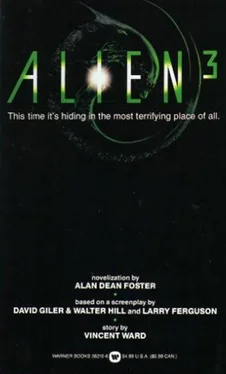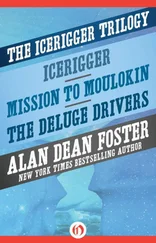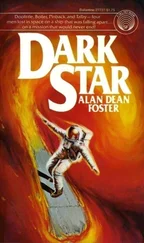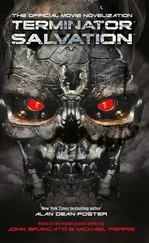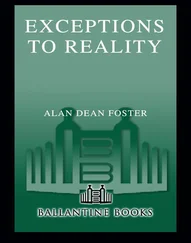Alan Dean Foster - Alien - 3
Здесь есть возможность читать онлайн «Alan Dean Foster - Alien - 3» весь текст электронной книги совершенно бесплатно (целиком полную версию без сокращений). В некоторых случаях можно слушать аудио, скачать через торрент в формате fb2 и присутствует краткое содержание. Год выпуска: 1992, ISBN: 1992, Издательство: Warner Books, Жанр: Фантастика и фэнтези, на английском языке. Описание произведения, (предисловие) а так же отзывы посетителей доступны на портале библиотеки ЛибКат.
- Название:Alien - 3
- Автор:
- Издательство:Warner Books
- Жанр:
- Год:1992
- ISBN:978-0446362160
- Рейтинг книги:4 / 5. Голосов: 1
-
Избранное:Добавить в избранное
- Отзывы:
-
Ваша оценка:
- 80
- 1
- 2
- 3
- 4
- 5
Alien - 3: краткое содержание, описание и аннотация
Предлагаем к чтению аннотацию, описание, краткое содержание или предисловие (зависит от того, что написал сам автор книги «Alien - 3»). Если вы не нашли необходимую информацию о книге — напишите в комментариях, мы постараемся отыскать её.
Alien - 3 — читать онлайн бесплатно полную книгу (весь текст) целиком
Ниже представлен текст книги, разбитый по страницам. Система сохранения места последней прочитанной страницы, позволяет с удобством читать онлайн бесплатно книгу «Alien - 3», без необходимости каждый раз заново искать на чём Вы остановились. Поставьте закладку, и сможете в любой момент перейти на страницу, на которой закончили чтение.
Интервал:
Закладка:
Alan Dean Doster
Alien — 3
With thanks to Insight Computers
of Tempe, Arizona
for their wonderful computers.
I
Bad dreams.
Funny thing about nightmares. They’re like a chronically recurring disease. Mental malaria. Just when you think you’ve got them licked they hit you all over again, sneaking up on you when you’re unprepared, when you’re completely relaxed and least expect them. Not a damn thing you can do about it, either. Not a damn thing. Can’t take any pills or potions, can’t ask for a retroactive injection. The only cure is good sound sleep, and that just feeds the infection.
So you try not to sleep. But in deep space you don’t have any choice. Avoid the cryonic chambers and the boredom on a deep-space transport will kill you. Or even worse, you’ll survive, dazed and mumbling after the sacrifice of ten, twenty, thirty years of useless consciousness. A lifetime wasted gazing at gauges, seeking enlightenment in the unvarying glare of readouts of limited colours. You can read, and watch the vid, and exercise, and think of what might have been had you opted to slay the boredom with deep sleep. Not many professions where it’s considered desirable to sleep on the job.
Not a bad deal at all. Pay’s good, and you have the chance to observe social and technological advance from a unique perspective. Postponing death does not equate with but rather mimics immortality.
Except for the nightmares. They’re the inescapable downside to serving on a deep-space vessel. Normal cure is to wake up. But you can’t wake up in deep sleep. The machines won’t let you. It’s their job to keep you under, slow down your body functions, delay awareness. Only, the engineers haven’t figured out yet how to slow down dreams and their bastard cousin the nightmare. So along with your respiration and circulation your unconscious musings are similarly drawn out, lengthened, extended. A single dream can last a year, two. Or a single nightmare.
Under certain circumstances being bored to death might be the preferable alternative. But you’ve got no options in deep sleep. The cold, the regulated atmosphere, the needles that poke and probe according to the preset medical programmes, rule your body, if not your life. When you lie down in deep sleep you surrender volition to the care of mechanicals, trusting in them, relying on them. And why not? Over the decades they’ve proven themselves a helluva lot more reliable than the people who designed them. Machines bear no grudges, engage in no animosity. The judgments they render are based solely on observation and analysis. Emotion is something they’re not required to quantify, much less act upon.
The machine that was the Sulaco was doing its job. The four sleepers on board alternately dreamt and rested, speeding along their preprogrammed course coddled by the best technology civilization could devise. It kept them alive, regulated their vitals, treated momentary blips in their systems.
Ripley, Hicks, Newt, even Bishop, though what was left of Bishop was easy to maintain. He was used to being turned on and off. Of the four he was the only one who didn’t dream, didn’t have nightmares. It was something he regretted. It seemed like such a waste of time, to sleep but not to dream.
However, the designers of the advanced android series to which he belonged would have regarded dreaming as an expensive frivolity, and therefore did not apply themselves to the resolution of the problem.
Naturally no one thought to inquire of the androids what they thought of the situation.
After Bishop, who technically was part of the ship and not the crew and therefore did not count, Hicks was the worst off of the sleepers. Not because his nightmares were any more severe than those of his companions, but because the injuries he had recently suffered did not lend themselves to extended neglect. He needed the attention of a modern, full-service medical facility, of which the closest example lay another two years travel time and an enormous distance away.
Ripley had done what she could for him, leaving final diagnosis and prescription to the efficient judgment of the Sulaco’s medical instrumentation, but as none of the ship’s medical personnel had survived the trouble on Acheron, his treatment was perforce minimal. A couple of years locked in deep sleep were not conducive to rapid healing. There was little she’d been able to do except watch him slide into protective unconsciousness and hope.
While the ship did its best his body labored to repair the damage. Slowing down his vitals helped because that likewise slowed down the spread of potential infection, but about the internal injuries he’d suffered, the ship could do nothing. He’d survived this long on determination, living off his reserves.
Now he needed surgery.
Something was moving in the sleep chamber that was not a part of the ship, though in the sense that it too was wholly driven by programming it was not so very different from the cold, indifferent corridors it stalked. A single imperative inspired its relentless search, drove it mindlessly onward. Not food, for it was not hungry and did not eat. Not sex, for it had none. It was motivated solely and completely by the desire to procreate. Though organic, it was as much a machine as the computers that guided the ship, though it was possessed of a determination quite foreign to them.
More than any other terrestrial creature it resembled a horseshoe crab with a flexible tail. It advanced across the smooth floor of the sleep chamber on articulated legs fashioned of an unusually carbon-rich chitin. Its physiology was simple, straightforward, and designed to carry out but one biological function and to do that better than any comparable construction known. No machine could have done better.
Guided by senses that were a unique combination of the primitive and sophisticated, driven by an embedded imperative unequalled in any other living being, it scuttled determinedly across the chamber.
Scaling the smooth flank of the cryonic cylinder was a simple matter for something so superbly engineered. The top of the chamber was fashioned of transparent metallic glass. Within slept a small organic shape; half-formed, blond, innocent save for her nightmares, which were as sophisticated and frequently more extensive than those of the adults sleeping nearby. Eyes closed, oblivious to the horror which explored the thin dome enclosing her, she slept on.
She was not dreaming. Presently the nightmare was concrete and very real. Far better that she remained unaware of its existence.
Impatiently the thing explored the sleep cylinder, beginning at one end and working methodically up to the head. The cylinder was tight, triple-sealed, in many ways more secure than the hull of the Sulaco itself. Though anxious, the creature was incapable of frustration. The prospect of imminent fulfillment of its biological imperative only excited it and drove it to greater efforts. The extensible tube which protruded from its ventral side probed the unyielding transparency which shielded the helpless body on the unreachable cushions, proximity to its quarry driving the creature into a frenzy of activity.
Sliding to one side, it eventually located the nearly impercep-tible line which separated the transparent dome of the cylinder from its metal base. Tiny claws drove into the minuscule crack as the incredibly powerful tail secured a purchase on the instrumentation at the head of the cylinder. The creature exerted tremendous leverage, its small body quivering with the effort.
Seals were strained. The thing’s effort was unforgiving, its reserves of strength inconceivable.
The lower edge of the transparent dome snapped, the metallic glass splitting parallel to the floor. A sliver of the clear material, sharp as a surgical instrument, drove straight through the creature’s body. Frigid air erupted from the cylinder until an internal emergency seal restored its atmospheric integrity.
Читать дальшеИнтервал:
Закладка:
Похожие книги на «Alien - 3»
Представляем Вашему вниманию похожие книги на «Alien - 3» списком для выбора. Мы отобрали схожую по названию и смыслу литературу в надежде предоставить читателям больше вариантов отыскать новые, интересные, ещё непрочитанные произведения.
Обсуждение, отзывы о книге «Alien - 3» и просто собственные мнения читателей. Оставьте ваши комментарии, напишите, что Вы думаете о произведении, его смысле или главных героях. Укажите что конкретно понравилось, а что нет, и почему Вы так считаете.
